Royale Union Saint-Gilloise is a professional football club who were formed on November 1st 1897, in the municipality of Saint-Gilles in the Belgian capital of Brussels. Historically, the club are one of the most successful in Belgium.
The club were first crowned as league champions as the team lifted the Championship Cup as the top flight was called in 1903-04 after finishing as runners-up the season before. Union retained the First Division title as the league had been renamed in 1904-05, 1905-06 and 1906-07 to make it four in a row.
The dominance of Saint-Gilloise continued as further league titles arrived at the club in 1908-09 and 1909-10 after finishing in second position in 1907-08 and then again at the end of the 1911-12 campaign. The league and cup double arrived in Saint-Gilles in the 1912-13 season. Cercle Sportif Brugeois were defeated 3-2 in the final of the Coupe de Belgique.
The cup was collected once more twelve months later as FC Brugeois, later Club Brugge, were beaten 2-1. The team came extremely close to completing the double in the 1913-14 season, but they finished in second spot in the league behind Daring Club Bruxelles.
Union moved from their ground on Rue de Forest, now Rue Joseph Bens, a mile or so south, to a brand new venue called Stade Joseph Marien, housed in a green setting on the edge of the Duden Park. Its inauguration took place on 14 September 1919.
The new stadium with its grand ornate main stand motivated the club to finish league runners-up in 1919-20, 1920-21 and 1921-22 before an eighth Belgian league title was won in 1922-23, before ending up in second place once more in 1923-24.
Union went on an incredible run the following decade and became First Division champions for three consecutive seasons: 1932-33, 1933-34 and 1934-35 as the team went sixty matches undefeated to become known as “La Lègende Union 60”.
He also took charge of the Belgium national team after a career in England as an inside forward with Luton Town, Barrow and Preston North End. He left to manage in France before his return. The Union players who played their part in the sixty-game run are as follows:
Goalkeeper: André Vandeweyer. Defenders: Jules Pappaert, Philibert Smellinckx and Félix Welkenhuysen. Midfielders: Jean Claessens, Victor Paeckmeyer and Jacques van Caelenberghe. Forwards: Pierre Ladurée, Frans van Haelen, Vital van Landeghem, François Vanden Eynde and Pierre Weydisch.
However, the run came to an end. Griffiths left Union to manage Valenciennes FC in France, and World War II disrupted activity shortly afterwards. The club struggled once peace was restored and finished bottom of the league in 1942-43.
A few mid-table finishes followed before the team finished bottom again in 1948-49 and were relegated to the Second Division. A runners-up spot was followed by the lifting of the second-tier title and promotion back to the top flight in 1950-51.
Between 1958 and 1965, the club had a brief spell of European success, playing the Inter-Cities Fairs Cup and reaching the semi-finals in the 1958–60 campaign after a two-legged victory against A.S. Roma.
A run of several seasons of safe finishes, including a couple where Union ended in third place, was broken in 1962-63 as the team were relegated once again. The team bounced back and regained its First Division status just twelve months later.
Unfortunately, the step up proved to come a bit early as the team were demoted once more in 1964-65. A First Division berth was secured once more at the end of the 1967-68 season as Saint-Gilloise finished as Second Division runners-up.
The team remained as a top-flight club until the 1972-73 season, when a second-bottom finish led to relegation. Worse was to come in 1974-75 as Union were relegated to the third tier of Belgian football.
The following campaign saw Union become champions of Third Division A to climb back to the second level. The 1979-80 season saw the club drop back to the third tier before plummeting to the provincial fourth level in 1981-82.
The club climbed straight back by winning the Fourth Division B title in 1982-83 before going up to the second tier in 1983-84 when they won Third Division A for a second time. However, they found themselves back at that level after relegation in 1985-86.
After several unremarkable seasons as Union generally finished halfway up the Second Division table, the team finished second bottom in 1992-93 and were relegated, with Disciacca finishing as top scorer. In 1995-96, the side was promoted as runners-up in Third Division A.
Union lasted just twelve months as a Second Division club before they were relegated yet again. The club were crowned as Belgian Third Division B: Winners in 2003-04 and remained in the second tier before another relegation followed in 2007-08. In 2014-15, Union won Third Division B for a second time and were promoted back to the Belgian First Division B.
Unfortunately, Stade Joseph Marien was deemed not up to scratch, meaning home games had to be played at King Baudouin Stadium, or Stade Roi Baudouin as known by the French-speaking locals. The team, led by head coach Marc Grosjean, finished the 2016-17 season in fourth place while work continued in expanding Stade Joseph Marien.
This was so that it could reach the required 8,000 capacity. Work was completed for the start of the 2018-19 season. In May 2018, Tony Bloom, the owner of Brighton & Hove Albion, was confirmed as Union’s majority shareholder. Luka Elsner was the head coach at this point, remaining in position until taking the manager's role at Amiens after taking his side to third place in 2018-19.
Youssouf Niakaté, Faïz Selemani and Roman Ferber provided the goals as Union just missed out on a shot at promotion. Former Leeds United boss Thomas Christiansen was appointed to lead the team for the 2019-20 campaign. KV Kortrijk ended any hopes of Coupe de Belgique glory as they knocked Union out at the quarter-final stage.
The truncated league season saw RUSG end in third place before Felice Mazzù arrived as manager. He led the side to the title as Dante Vanzeir led the scoring chart. Deniz Undav struck regularly in 2021-22 as Union SG finished as league runners-up before the arrival of new manager, Karel Geraerts.
Alexander Blessin was appointed as manager in July 2023, taking his side to victory in the Coupe de Belgique as Royal Antwerp were defeated 1-0 through a Kōki Machida goal, as well as ending as league runners-up. Sébastien Pocognoli managed the team to the Belgian title in the 2024-25 season, as Promise David and Franjo Ivanović scored the goals.
Royale Union Saint-Gilloise will play in the Belgian Pro League in the 2025-26 season.
My visits
Thursday 20th October 2016
My spare morning in Brussels had been nearly filled with visits to several stadiums. Stade Roi Baudouin, Heysel II, the Stade Edmond Machtens home of RWDM47 and White Star, as well as RSC Anderlecht, were all ticked, before I took a bus and metro to Gare du Midi.
Outside, I took the number 32 tram to the Châtaignes stop, from where it was just a few minutes walk along Rue des Châtaignes to Chaussée de Bruxelles, where the iconic façade of the stand came into view. Fortunately, the gate next to the stand was open, so I was free to pop inside to take my photos of a truly traditional venue.
The Main Stand consisted of a raised seating deck going the full length of the side by the road, while opposite was a large bank of open terracing. The far end was occupied by grass banking and hard standing, while the entrance end was flat, open concrete with club offices.
I followed my same route back into the city to catch my train to Genk for that evening’s Europa League tie. It was several months later when I read about the work being done on Stade Joseph Marien. I just hope that it didn’t spoil its natural beauty or that stunning stand.
At Stade Roi Baudouin
Union Saint-Gilloise 3 KVC Westerlo 0 (Saturday 19th August 2017) Belgian First Division B (att: c1,300)
Although I really liked Union’s Stade Joseph Marien on my previous visit to Brussels, I was going to have to return a year or so later if I wanted to see any competitive league action being played there.
The league regulations stipulated that each venue needed a minimum capacity of 8,000. Work was ongoing, but in the meantime, the first team had decamped across the city to Stade Roi Baudouin.
The 5pm kick-off time left options for other matches afterwards, and I had my eye on a couple in the league. I’d posted on the Facebook ‘European Football Weekends’ site asking for advice. Anthony Vargas, a fellow hopper, was also attending the Union game, so we arranged to meet up.
We were both eager to head off to the KV Mechelen v Royal Antwerp local derby, but tickets were scarce. Anthony managed to get hold of one, but I had seen another alternative in the Coupe de Belgique, which you can read about here.
I’d arrived in the capital from Liège that morning and had been to a couple of smaller venues before checking into the Hotel Sabina. After a nap, I headed out again, towards Heysel, but also checking out more venues.
I’d taken the Metro and then bus to Ganshoren and then Jette while keeping in touch with Anthony regarding our 4pm meet. I was a little later than intended after being drenched in a storm, but we met up at the ticket office in good time.
After a thorough frisk, I showed my new pal the Heysel II smaller stadium and the monument to the disaster of 1985 before we entered the Main Stand. At this point, there were more stewards than fans outside.
The huge building was hardly occupied, with absolutely no signage as to where to gain entry to the seats. We ended up entering towards the back of the lower tier. Even though it was obvious that there would be lots of space, the stewards were most diligent in ensuring we entered the correct block.
A couple of fans appeared to have drinks, so we walked down the steps and out an entrance lower down, which led to a concourse with a couple of basic concessions and a limited souvenir stand.
Refreshments were obtained by pre-purchased vouchers, as in many European grounds. Beers or soft drinks were €2, but there appeared to be no food for sale. This was not good as I’d hardly eaten all day.
A couple of rather aesthetic young ladies wearing scant clothing in club colours easily caught the attention while we enjoyed our drinks. It was just a shame that the stadium authorities didn’t make a bit more effort.
We took up position towards the front of the seating as Union’s regulars started taking up their positions. They were obviously wise to the sparse facilities and only turned up near to kick-off time.
A couple of camera crews were filming in the aisles. We weren’t sure if it was for the live TV coverage or for club materials. It was good to see that Union SG had plenty of vibrant young support who made plenty of noise to rally their troops.
The Westerlo fans were to our right in the corner section on the curve, with a decent view. They also made some noise, which echoed around the stadium. Union entered the game having not scored in their opening two defeats.
It was good to meet up with Anthony, as we went through the usual conversations of ground hoppers. We both enjoyed the opening exchanges as both sides were eager to attack. Koen Van Langendonck, in the visitors’ goal, denied Union forward Serge Tabekou and Mathias Fixelles.
However, he could do nothing to stop USG going ahead six minutes before the break, as former Westerlo midfielder Julien Vercauteren fired in a fine shot from twenty-five yards that dipped over the custodian and into the net.
I went down for the drinks right on the interval before we took up a position towards the rear, just behind the most vocal fans. Our view was massively improved, as was the atmosphere.
Union came out of the blocks flying at the start of the second half. Tabekou had a shot that came back off the foot of the post, and though Westerlo had plenty of play, they didn’t really look like scoring.
Just before the hour mark, Vercauteren turned provider as his excellent free kick was pushed onto the frame of the goal by Van Langendonck before Roman Faber swooped to nod in the rebound.
Westerlo had a gilt-edged chance to reduce the arrears as Konstantinos Rougalas beat the offside trap from a free kick to find himself alone in the penalty area. However, his weak effort was saved by the feet of Union goalie Nicaise Kudimbana.
The final goal came on the seventy-fourth minute, as the impressive Tabekou beat his man for strength and pace before whipping in a low cross, which Vercauteren flicked home with nonchalance across the goal.
Westerlo’s players didn’t take their beating too well, as some silly challenges were put in to test the patience of both the referee and the home players. They’d had plenty of possession throughout, but they didn’t do too much with it. That was their own fault.
The atmosphere had been brilliant where we were located. It even sounded decent on the TV highlights later. It just seemed such a shame that Union had to play in such a large arena across the city from their traditional home.
Anthony headed off for Mechelen soon after the third goal, while I headed for the exits with five minutes remaining to head to Molenbeek for some cup action. The Union match had certainly put me in the right frame of mind.
At Stade Joseph Marien
At Stade Joseph Marien
Royale Union Saint-Gilloise 0 Westerlo 0 after extra time; RUSG won 4-1 on penalties (Wednesday 4th December 2019) Coupe de Belgique 8th Finals (att: 1,591)
My options for a match in Belgium were open before I headed on holiday to Thailand, as I waited for the dates of the cup fixtures to be announced to fit in with the TV schedules. A match at the redeveloped Stade Joseph Marien suited me fine. By coincidence, it was against Westerlo again!
Most people would surmise that it would be a straightforward and relatively short journey from London to Brussels. However, I went about it in a way that had my colleagues at work scratching their heads!
The previous day, I’d completed my night shift at 06:30 and then travelled to Pisa for a whistle-stop sightseeing venture before heading to Florence for more culture and to attend the Coppa Italia clash between Fiorentina and Cittadella.
I’d awoken at 06:00 and taken a train and then a bus to Bologna Airport. I’d found a cheaper route back to London would be via the Belgian capital. The matches in the Croky Belgian Cup were an added attraction.
My flight from Bologna to Charleroi cost just €6. It was delayed by half an hour, but I couldn’t really complain. The journey offered me the opportunity of more welcome sleep before the bus journey to Bruxelles-Midi. There was precious little chance of any rest on the trip to the city, as a young woman proved to have as piercing a set of elbows as any former strikers of 1980s vintage.
I’m a very tolerant traveller, but was reaching my breaking point as we finally pulled in. Having obtained a 24-hour travel card, I headed to the Bourse on the Metro to take in a few sights. It would have been most remiss not to remind myself of the beauty of Grand Place while in the city.
Having grabbed a snack, I decided to walk along Rue du Midi to my bed for the night at Hotel Aristote. Now, over the years, I’ve stayed at hotels of varying quality. To me, it’s just somewhere to rest my head. If you’re relying on staying in your room, I think you’ve picked a dull destination.
I tend to look to save money on accommodation so that I can spend it on food, drink, travel and sport. I am not massively fussy. However, this latest choice was right up there with as poor a condition as I’d ever stayed in. It was dreadful, dangerous in parts and not very clean.
Thankfully, I was tired enough for a siesta before I made tracks for the evening’s entertainment. I had a couple of bars in mind on route, with the number 48 bus stopping just across the square. It took me through the centre to drop me at Parvis Saint-Gilles.
The wide market square opposite had a good choice of establishments. I’d read online about a connection with the football club and Brasserie de l'Union, so I gave it a go. Despite not finding any connection, I enjoyed my couple of beers in an excellent local bar.
My subconscious knew that I needed to find an ATM, but I got carried away in the moment, as I often do in nice places on my travels. I no doubt walked past some on Sint-Gillisvoorplein, but I was oblivious as I headed to the bus stop while thinking of the next bar.
It was only when I alighted at Rochefort that I realised my error. I walked towards the stadium, hoping to see an ATM in a wall on the way. However, cash machines aren’t as prevalent in Brussels as in UK towns and cities.
Chez Katty, the Clubhouse under the grandstand and Union's Taverne all looked so welcoming; yet I was down to my last €7 in cash. I needed some more to enjoy myself and have some food and drink.
Fortunately, my ticket had already been purchased and printed online at a cost of just €5. I’d received superb service when the PDF hadn’t originally arrived in my inbox from Benoît at Union’s ticketing department.
I tried Pharmacie Dave on Rue des Châtaignes, but the proprietor didn’t speak English and couldn’t help. I should have jumped on an arriving tram at the nearby stop and gone to Midi and back. It would have been quicker, but I thought I knew better at the time.
My iPhone App sent me in the direction of the Forest National Concert Hall. It was typical of the way my evening was going that there was a gig on and the area outside was busy. It appears the act was a band called M. I don’t think it was the same 80’s synth outfit that had a hit with Pop Muzik?
Whatever, those attending had formed a queue for the ATM BNP Paribas dispenser. I was muttering under my breath as some seemed to be having trouble getting cash and taking up valuable time. Unbelievably, neither of my cards would allow me to withdraw.
Off I chuntered, hungry and thirsty. At least the walk back was downhill. I was left with a choice. Food or beer. I was mulling it over as I took photos of inside the main entrance and was handed a free teamsheet.
I wanted to see the memorabilia inside the clubhouse, so the beer won. I purchased a couple of vouchers for Jupiler beers and had a look around. It took me back to happy days in such buildings before many similar grounds back home were demolished in the name of progress.
It was soon time to head inside. My first sight of the redeveloped arena was most favourable. They’d done a superb sympathetic job and kept its true character. I was especially impressed with the work carried out on the away section with its huge high corner.
It was a very cold evening, but fortunately missing the wind I’d encountered in Florence the previous evening. I took up a place on the open terraced Kop near the back and close to half-way. The locals were drumming up a decent atmosphere.
Union launched the first attack of the game in five minutes when Isaiah Young, on loan from Werder Bremen, set up Roman Ferber, who failed to control the ball when well placed. Kevin Kis put in a dangerous ball, which evaded any teammates shortly after.
Young went on a run but couldn’t get a clear shot away before the visitors, cheered on by 76 fans, had a half-chance at the other end after twenty-two minutes. Young and Ferber continued to look dangerous as the half progressed.
A Westerlo free kick was safely gathered by Union’s Norwegian goalkeeper Anders Kristiansen as the queues continued at the bar behind me. I was slightly surprised by just how much beer was being consumed on such a cold night. Perhaps I was just jealous?
Young shot just over five minutes before the interval, and then Ferber saw his effort deflected for a corner that came to nothing. At the interval I had a walk around trying to keep warm; more in hope than expectation of seeing card transactions taking place.
The home club certainly had some characters among their support. There was definitely something I liked about the experience, as I had at Molenbeek a few years earlier. They certainly weren’t in it for the glory.
The visitors went close to breaking the deadlock shortly after the restart with a shot that went narrowly over. Kristiansen denied Kurt Abrahams, as Westerlo suddenly looked like the most likely side to score.
Union sub Teddy Teuma had an effort pushed away by Koen Van Langendonck shortly after his introduction in the sixty-fifth minute. The home side coach, Thomas Christiansen, used up all his changes in an attempt to open the game up.
Despite plenty of tactical skills from both sets of players, there was never going to be a goal in ninety minutes. All things considered, I decided to take the option of heading away at the end of normal time.
It looked as though I missed very little in the additional thirty minutes of extra time before Union prevailed on penalties as Teuma, Mathias Fixelles, Sigurd Hauso Haugen and Casper Nielsen scored with keeper Kristiansen playing his part to send his team through to the quarter finals.
My evening’s mishaps continued. I caught the wrong tram but managed to correct myself before taking a bus to the Grand Place for some more scenic photography by the illuminated Christmas tree.
Eventually, I found a cash machine after eating at McDonald's and grabbing a welcoming hot tea. I tried Mappa Mundo for a bar, but it was too busy. Despite considering O’Reilly’s, I was tired and still hungry. Heading home seemed a smarter option.
A couple of bars were closing near the hotel, which was a bit of a shame. They looked OK. Instead, I settled for a baguette which turned out to be filled with tough meat despite looking attractive on selection, along with a bottle of water and a read of my book in bed.
The following morning, I headed to the airport via Brussel-Noord. The British Airways flight seemed to offer reassuring comfort despite knowing I’d be heading to work when I got out at Heathrow. My adventure proved to be far from over, as it transpired that I’d somehow lost my Staff Oyster card, meaning the carry on of having to fill out forms.
I also had to pay for journeys until the new card was sent out. It raised a few eyebrows at work when asked on the form where I may have lost it, as I answered with Stanstead, Pisa, Florence, Bologna, Charleroi, Brussels, Heathrow or any point in between!
Not everything had gone exactly to plan, but I had great fun despite mishaps, which I’d mainly caused myself. I was certainly glad to have watched a game at the traditional but updated Stade Joseph Marien, where good, helpful people run things.







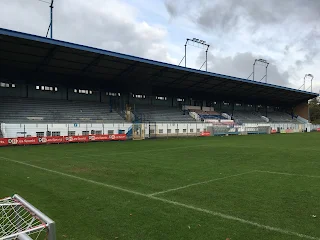

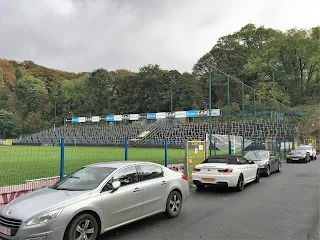




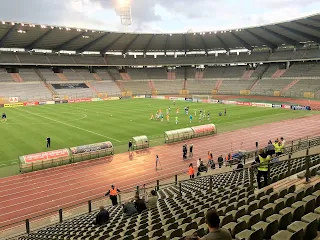














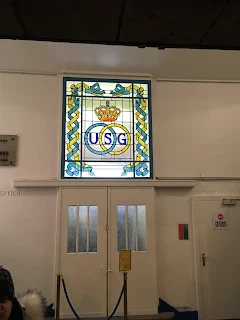








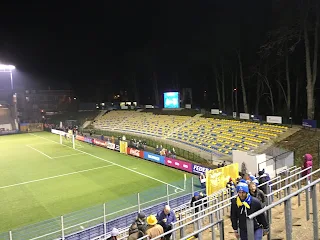





No comments:
Post a Comment